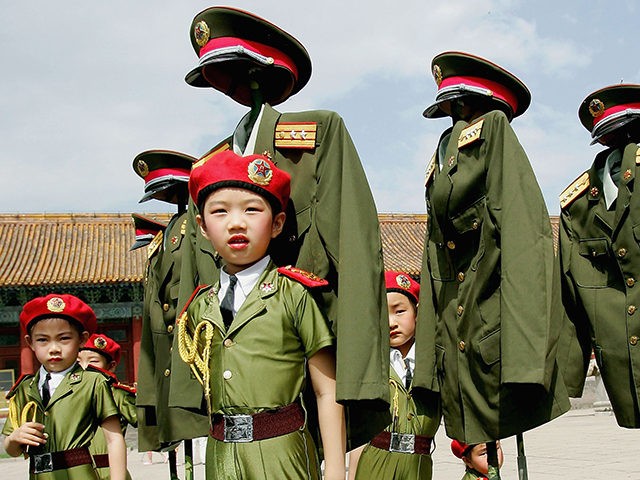Chinese state media celebrated an alleged boom in sales of communist uniforms on Tuesday in anticipation of the country’s “Children’s Day,” which occurs every June 13.
In China, some communist fanatics dress their children in “red clothes” — meaning Communist Party uniforms, not simply red-colored clothing — on special occasions marking milestones in the history of Maoism in the country. Dictator Xi Jinping has refocused the energy of the state towards indoctrinating children through the revamping of local school curricula, banning minors from practicing any religion, and events emphasizing the importance of youth to the Party.
This year will mark the 100th anniversary of the founding of the Chinese Communist Party, which the state propaganda newspaper Global Times claimed has inspired loyal communist parents to invest in buying more “red clothes” for their children to celebrate Children’s Day.
“The Global Times learnt from shops on China’s e-commerce platform Taobao that sales of Red Army clothes of different styles for kids have seen an obvious increase since April and many buyers placed orders for performances on China’s Children’s Day, which falls on June 1,” the propaganda outlet noted Tuesday. “The owner of Mengni Cool Kid, a clothes shop on Taobao that has sold more than 8,000 Red Army clothes items, told the Global Times on Tuesday that the number of people buying and inquiring about the clothes has ‘significantly grown’ in May, and sales are three to four times the level in previous months.”
The Global Times cited anecdotal evidence from comments on the shopping sites to suggest that the uniforms “will be used in school performances for the festival, with kindergartens and primary schools organizing various gala events.” The admission suggests that state-controlled schools, presumably staging these events, are forcing parents to buy uniforms for their children, which undermines the claim that parents are buying more communist uniforms out of ideological fervor. China heavily censors all online media platforms in the country, which means the comments the Times is referencing are those approved by the Party — censors swiftly remove anything considered to be running afoul of Party messaging and often take legal action against those writing the offending posts.
The state media outlet offered some description of the “red” events that primary and secondary schools are staging, often forcing the children to reenact historical moments. Among them is the “Long March,” the 1934 mass migration of communist soldiers 6,000 miles north under Mao Zedong’s direction in what became a successful attempt to overthrow the Nationalists. The Long March killed at least 30,000 people, a modest death toll compared to the 45 million Mao later killed in the Great Leap Forward.
On Tuesday, a teacher in Shanghai described to the Global Times how her school organized a performance about the Long March in the 1930s and the kids were all wearing red army clothes bought online to match the theme of the show.”
The Chinese Communist Party’s investment in youth has become more of a priority after years of failed attempts to spur ideological fervor in the Millennial generation, typically defined as those born between 1981 and 1996. A barrage of school indoctrination and Party-approved popular culture — including a rap song titled “Marx Is a Millennial” — prompted a backlash that manifested itself as a trend known as “sang culture,” a form of existentialism in which Millennials do not seek to achieve anything in life or expect any success to come their way.
To avoid making the same mistake again, Chinese media have embarked on a campaign to promote “red tourism” — taking children to the sites of historic moments celebrated by the Party, including stops along the Long March or Beijing’s Tiananmen Square, where Party officials massacred thousands of peaceful protesters in 1989. The recent May Day holiday — known by communists around the world as International Workers’ Day, celebrated on May 1 — is a five-day affair in China, and this year officials heavily encouraged travel despite the ongoing Chinese coronavirus pandemic. Two weeks later, multiple outbreaks on the nation’s eastern seaboard have triggered panic among health officials.
“Among the core population for red tourism in this holidays, people aged 21 to 30 accounted for more than 40 percent, the biggest group of all ages. Overall population under 40 accounted for 89.1 percent, according to a report by the Tongcheng Tourism Institute,” the Global Times claimed following the end of the May Day vacation week. “A recent report by Alibaba’s Fliggy revealed that ‘red tourism’ bookings by people born during the 2000s saw a 630 percent year-on-year increase.”
Dictator Xi Jinping has ordered Party officials in the past to make the indoctrination of children a priority.
“We need to … strengthen political guidance for young people, guide them to voluntarily insist on the Party’s leadership, to listen to the Party and follow the Party,” he said at a conference in April 2019, according to Freedom House. The human rights organization noted that, in other speeches, Xi warned teachers to react sternly to “wrong ideas” in the classroom and to “carry forward the main melody and actively convey positive energy,” meaning to promote positive opinions about communism.
A campaign of persecution against teachers considered insufficiently loyal to the Party followed his remarks.

COMMENTS
Please let us know if you're having issues with commenting.